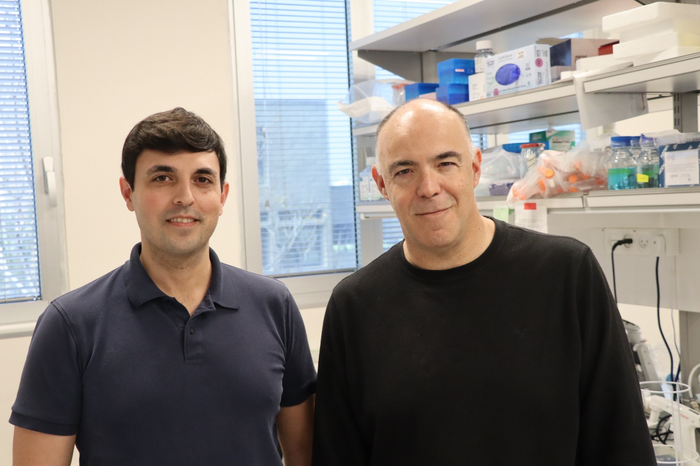For the first time in the world: a team of researchers from Tel Aviv University and the Israel Institute for Biological Research have developed an mRNA-based vaccine that is 100% effective against a type of bacteria that is lethal to humans. The study, conducted in an animal model, demonstrated that all treated animals were fully protected against the bacteria. According to the researchers, their new technology can enable rapid development of effective vaccines for bacterial diseases, including diseases caused by antibiotic-resistant bacteria, for example in case of a new fast-spreading pandemic.

Credit: Photo credit: Tel Aviv University. (Tel Aviv University grants permission for the use of these photos/images for stories on TAU research).
- So far mRNA vaccines, like those targeting COVID-19, have been effective against viruses but not against bacteria.
- Now, for the first time in the world, researchers have developed an mRNA vaccine for deadly bacteria, paving the way for effective vaccination against antibiotic-resistant bacteria.
For the first time in the world: a team of researchers from Tel Aviv University and the Israel Institute for Biological Research have developed an mRNA-based vaccine that is 100% effective against a type of bacteria that is lethal to humans. The study, conducted in an animal model, demonstrated that all treated animals were fully protected against the bacteria. According to the researchers, their new technology can enable rapid development of effective vaccines for bacterial diseases, including diseases caused by antibiotic-resistant bacteria, for example in case of a new fast-spreading pandemic.
The study was led by Tel Aviv University’s Dr. Edo Kon and Prof. Dan Peer, VP for R&D and Head of the Laboratory of Precision Nano-Medicine at the Shmunis School of Biomedicine and Cancer Research, in collaboration with researchers from the Israel Institute for Biological Research: Dr. Yinon Levy, Uri Elia, Dr. Emanuelle Mamroud, and Dr. Ofer Cohen. The study’s results were published in the journal Science Advances.
Link to the research video:
Edo Kon explains: “So far mRNA vaccines, such as the COVID-19 vaccines familiar to all of us, were assumed to be effective against viruses but not against bacteria. The great advantage of these vaccines, in addition to their effectiveness, is the ability to develop them very quickly: once the genetic sequence of the virus SARS-CoV2 (COVID-19) was published, it took only 63 days to begin the first clinical trial. However, until now scientists believed that mRNA vaccines against bacteria were biologically undoable. In our study we proved that it is in fact possible to develop 100%-effective mRNA vaccines for deadly bacteria.”
The researchers explain that viruses depend on external (host) cells for their reproduction. Inserting its own mRNA molecule into a human cell, a virus uses our cells as a factory for producing viral proteins based on its own genetic material, namely replicates of itself. In mRNA vaccines this same molecule is synthesized in a lab, then wrapped in lipid nanoparticles resembling the membrane of human cells. When the vaccine is injected into our body, the lipids stick to our cells, and consequently the cells produce viral proteins. The immune system, becoming familiar with these proteins, learns how to protect our body in the event of exposure to the real virus.
Kon adds: “Since viruses produce their proteins inside our cells, the proteins translated from the viral genetic sequence are similar to those translated from the lab-synthesized mRNA. Bacteria, however, are a whole different story: They don’t need our cells to produce their own proteins. And since the evolutions of humans and bacteria are quite different from one another, proteins produced in bacteria can be different from those produced in human cells, even when based on the same genetic sequence.
“Researchers have tried to synthesize bacterial proteins in human cells, but exposure to these proteins resulted in low antibodies and a general lack of protective immune effect, in our bodies. This is because, even though the proteins produced in the bacteria are essentially identical to those synthesized in the lab, being based on the same ‘manufacturing instructions’, those produced in human cells undergo significant changes, like the addition of sugars, when secreted from the human cell. To address this problem, we developed methods to secrete the bacterial proteins while bypassing the classical secretion pathways, which are problematic for this application. The result was a significant immune response, with the immune system identifying the proteins in the vaccine as immunogenic bacterial proteins. To enhance the bacterial protein’s stability and make sure that it does not disintegrate too quickly inside the body, we buttressed it with a section of human protein. By combining the two breakthrough strategies we obtained a full immune response.”
Prof. Peer: “There are many pathogenic bacteria for which we have no vaccines. Moreover, due to excessive use of antibiotics over the last few decades, many bacteria have developed resistance to antibiotics, reducing the effectiveness of these important drugs. Consequently, antibiotic-resistant bacteria already pose a real threat to human health worldwide. Developing a new type of vaccine may provide an answer to this global problem. In our study we tested our novel mRNA vaccine in animals infected with a deadly bacterium. Within a week, all unvaccinated animals died, while those vaccinated with our vaccine remained alive and well. Moreover, in one of our vaccination methods, one dose provided full protection just two weeks after it was administered. The ability to provide full protection with just one dose is crucial for protection against future outbreaks of fast-spreading bacterial pandemics. It is important to note that the COVID-19 vaccine was developed so quickly because it relied on years of research on mRNA vaccines for similar viruses. If tomorrow we face some kind of bacterial pandemic, our study will provide a pathway for quickly developing safe and effective mRNA vaccines.”
The study was funded by research grants from the European Union (ERC; EXPERT) and the Shmunis Family (for Prof. Peer).
Link to the article:
https://www.science.org/doi/10.1126/sciadv.adg1036
DOI
10.1126/sciadv.adg1036




